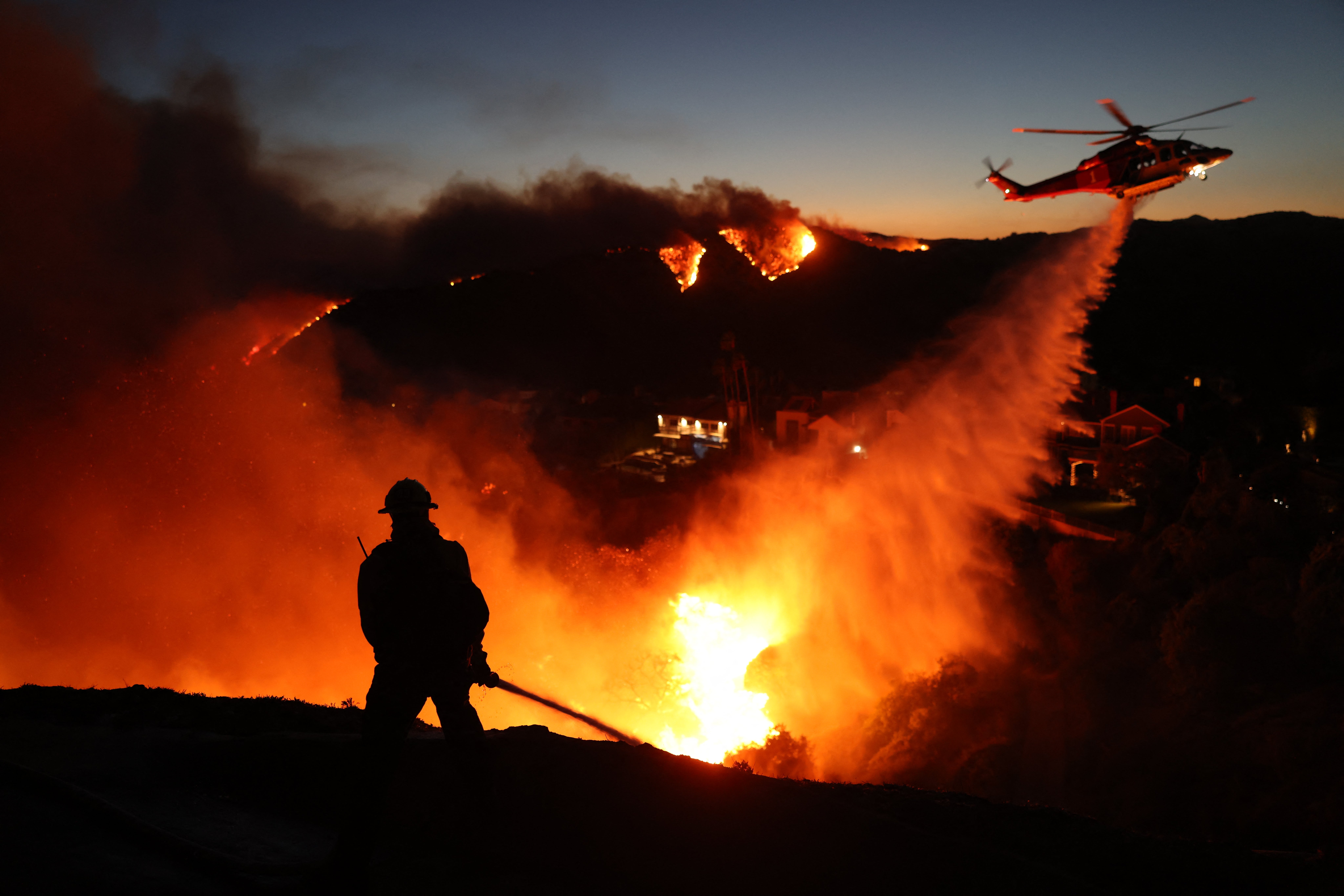The UK is critically unprepared for the escalating threats of climate change, the Climate Change Committee (CCC) has warned, accusing the government of inaction in the face of impending floods, heatwaves, droughts, and wildfires.
A new report from the independent advisory body highlights a stark lack of progress since its 2023 assessment, raising concerns that crucial funding for safeguarding communities and vital services like the NHS could be slashed in upcoming spending reviews.
The report comes after The Independent reported Tony Blair has staged a dramatic intervention over Sir Keir Starmer’s government’s pursuit of net zero policies.
The CCC paints a grim picture of the future, projecting a surge in flood-risk properties from 6.3 million to eight million – a staggering one in four – by 2050. Heatwave-related deaths, already alarming at 3,000 during the scorching summer of 2022, are predicted to triple to 10,000 annually by mid-century.
The report underscores the economic repercussions of climate inaction, forecasting a 7 per cent blow to the UK’s economic output by 2050. Rising sea levels exacerbate coastal flooding, while extreme temperatures and drought fuel an increasing number of wildfires.
The agricultural sector is also facing significant challenges, with half of the UK’s prime farmland already vulnerable to flooding, a situation set to worsen. The CCC emphasizes the vulnerability of essential public services, including schools, hospitals, and care homes, to the impacts of extreme weather, particularly heatwaves.

Baroness Brown, chairwoman of the CCC, pointed to the 2022 heatwave as a stark illustration of the nation’s unpreparedness. Temperatures exceeding 40C for the first time not only resulted in thousands of deaths but also placed immense strain on emergency services and disrupted hospital operations.
The CCC’s report serves as a dire warning, urging immediate action to mitigate the escalating risks of climate change and protect the nation from “tomorrow’s disaster.”
And she warned children were sitting national examinations that define their future in summer in sweltering temperatures, while record wet conditions from 2022-2024 caused devastating flooding and damage to food production.
“All of this and we are seeing no increase in action,” Baroness Brown said.
The committee’s assessment looked at 46 areas where adaptation needed to be delivered, and found only good progress in plans and policies for three – making rail and strategic road networks reliable and ensuring risks were properly disclosed and managed by financial institutions.
On delivery, not a single measure – from ensuring resilience in nature and farmland to water, food and energy supplies – was making good progress, with 12 areas rated insufficient.
The committee warned delivery had actually worsened in the water sector because of a lack of credible plans to cut leaks and reduce water demand in the face of worsening drought risk.
The committee said the previous government’s action plan fell short of preparing the UK for the climate change already being experienced, let alone the future, but found little evidence of change now despite Labour’s manifesto promising to “improve resilience and preparation” for the country.

Baroness Brown said: “People are worrying about the impacts of extreme weather, worrying about food prices. People are worried about what’s going to happen to their vulnerable friends and relatives.
“Despite all this, we are seeing no such change in activity from the new government, despite the fact that it’s clear to my committee, it’s increasingly clear to the public that the current approach to adaptation policy just isn’t working.
“Our message is the country is at risk, people are at risk, and there’s not enough being done.”
She added: “We can’t wait to take action, this is not tomorrow’s problem, it’s today’s problem, and if we don’t do something about it, it will become tomorrow’s disaster.”
A wide array of measures are needed, from building new resilient hospitals and retrofitting existing ones with air conditioning and green roofs for cooling, to ensuring people know what to do in a heatwave such as closing windows and curtains in the morning.
Standards for new homes need to prevent overheating and ensure they are not at risk of flooding, while agricultural subsidies, the 25-year farming plan and food strategy should all support efforts to adapt nature and food production to the changing climate.
Baroness Brown also suggested the level of personal protective equipment (PPE) still being used post-Covid needed to be reviewed, to reduce costs and plastic waste and allow staff to work more comfortably in the heat.
The report calls for the Government to improve its objectives and set clear targets for what needs to be achieved, improve coordination across departments, and implement monitoring and evaluation of climate impacts and the effect of adaptation measures.
This summer’s spending review must ensure climate adaptation planning is supported with sufficient resources, critical public services such as the NHS need to be resilient to current and future weather, and new infrastructure must be built with climate in mind so it does not need costly retrofitting.
But the committee raised concerns that the Government had said last autumn that there was a need to review flood defence spending in light of financial pressures, raising fears it signalled cuts in the spending review.
Baroness Brown said: “We are seriously concerned that resilience and climate adaptation may be cut in the spending review.
“Government needs to recognise this is not a future problem, it’s today’s problem,” she urged.
Campaigners described the report as a “wake-up call” for Government, with WWF’s head of climate policy Bella O’Dowd saying: “The evidence is clear: action on climate unlocks economic opportunities, improves our health and saves lives.
“Farmers, communities and businesses can’t afford any more delays.”
And Dr Friederike Otto, from Imperial College London, an expert on climate’s role in extreme weather said: “Climate change is already hurting the UK – more intense heatwaves and floods are damaging infrastructure, reducing worker productivity, wiping out crops, and putting more pressure on the NHS.
“Given the Government’s current focus on growth, it is hard to believe there has not been a renewed focus on adaptation, which could save the UK billions of pounds in avoided losses.”




